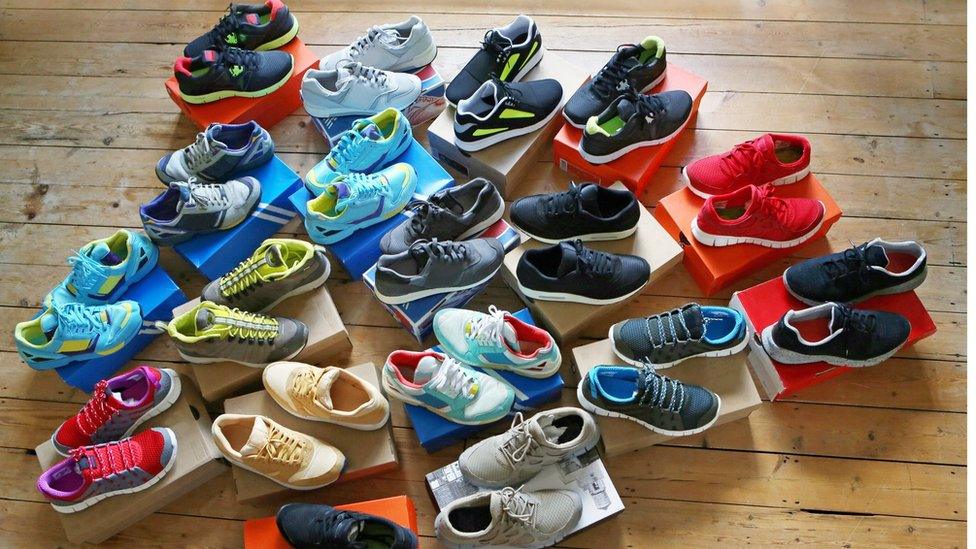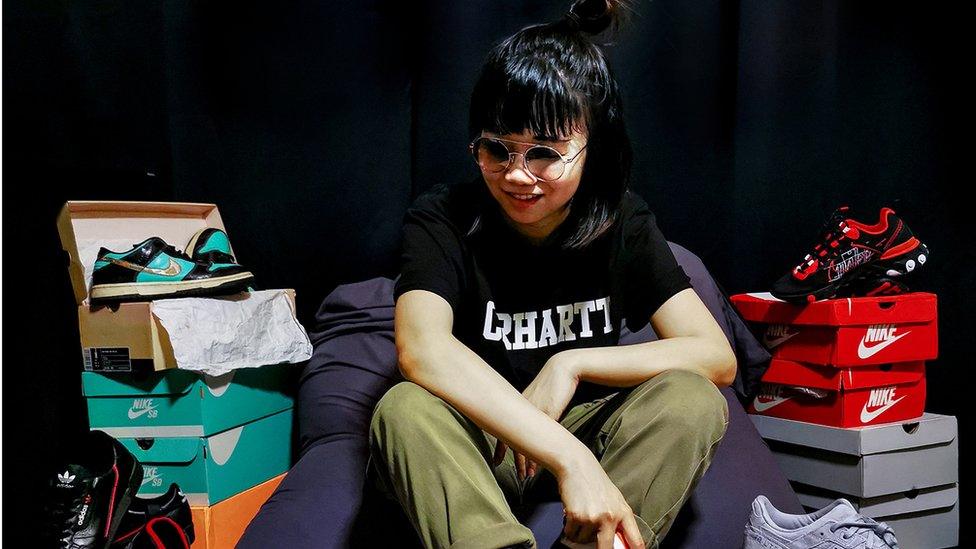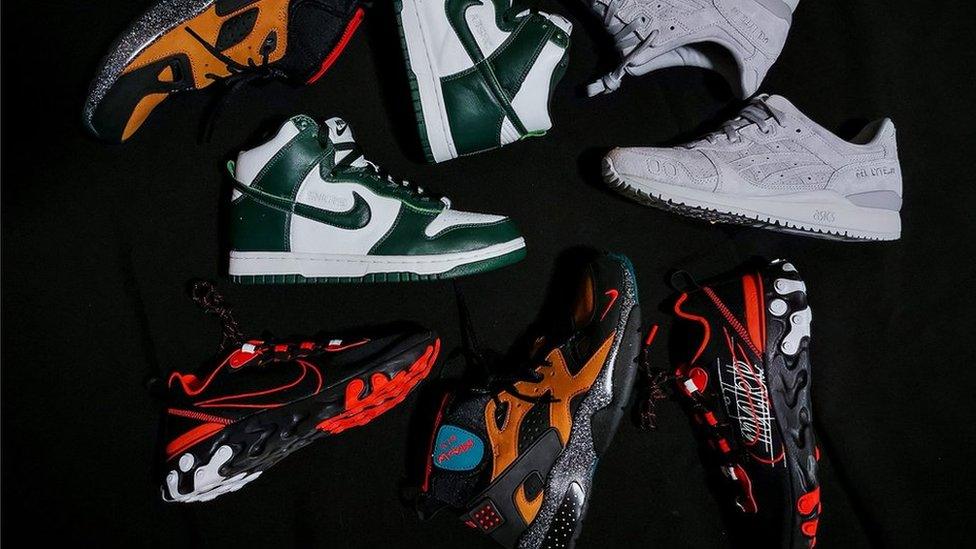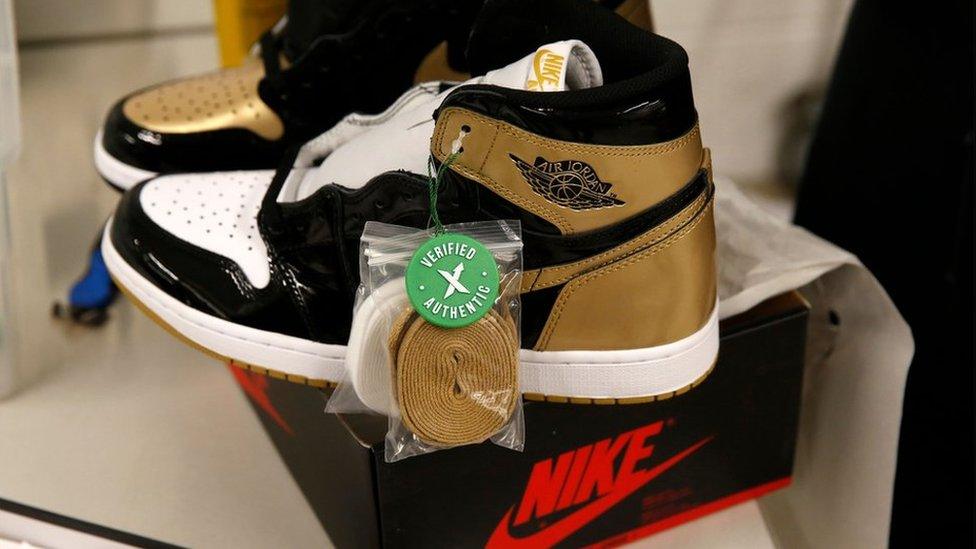StockX: Asian sneakerheads give trainer traders a spring in their step
- Published

A stock market for trainers that allows people to buy and sell shoes using real-time data is expanding into Asia.
Asia is one of the fastest growing regions for StockX, a US tech firm that set up the shoe exchange.
Since its launch in 2016 the platform has grown rapidly and now has 115,000 products listed and close to 1,000 staff globally.
On Tuesday, StockX opened a new bricks-and-mortar centre in Hong Kong that will make it easier to trade trainers.
In the last year, transactions in Asia have risen more than 500% with Hong Kong leading the way, StockX chief executive Scott Cutler told the BBC.
Trading trainers, or sneakers depending on your preference, is big business and rare shoes sell for thousands of dollars.
A pair of trainers worn by basketball legend Michael Jordan fetched $615,000 (£460,000) at an online auction in August.
The Nike Air Jordan 1 High sneakers, described as the "rarest of the rare", were used by the Chicago Bulls star in an exhibition game in 1985.
For many, the Air Jordan 1s are the shoe that kickstarted the global sneaker resale market, an industry recently valued at $6bn (£4.6bn) by Cowen Equity Research, and predicted to be worth $30bn by 2030.
The guy designing sneakers for NBA stars... and Cristiano Ronaldo
Given the rapid rise in interest and prices, StockX decided to launch an exchange which mirrors a stock market for shares.
The StockX platform, which describes itself as "the world's first stock market for things", connects buyers and sellers using real-time data to work out a fair market value, much like trading shares.
For every item listed, StockX collects information like release date, retail price, how many units have sold and previous sale prices.
"We have an extremely active customer base across key Asian markets, and we've seen tremendous growth within Hong Kong in particular," he added.

Jeranne Ang now customises trainers
Singapore-based trainer fan Jeranne Ang is among those Asian customers. She has the StockX app on her phone which she uses to do price checks on the sneakers she owns and wants to sell.
"Most of the time I use it to check for market rates as it is like an investment trading app, just that they trade in sneakers instead," she said.
Ms Ang now owns more than 50 pairs of sneakers since she started collecting them in late 2016.
She has started designing her own shoes and customising them for other people, and wants to launch her own brand called Absence next year.

Part of Jeranne Ang's personal collection
StockX's new authentication centre will act as a regional hub serving China, Hong Kong, Taiwan and Singapore, and will result in lower fees, reduced shipping times and faster payouts across the region.
It will check every pair of trainers before it is shipped out to a buyer, including checking for fakes, although, Mr Cutler added, "we see fewer and fewer of them at StockX due to the fact that we sit in the middle of the transaction and fraudsters know that to be the case".
StockX, which also allows the trade of streetwear, handbags and watches, takes a transaction fee starting at about 10%.
Rivals to StockX include Sole360, which charges a flat fee of $20 per trade, and South East Asian-based Novelship. But these sites are far smaller in terms of listings and active traders.

Asia, and in particular China, is an important market for Nike
StockX is not the only sneaker company enjoying an Asian boom. Nike has also seen huge growth in Asia.
Last week, the US sports brand took part in China's Singles Day - the world's biggest online shopping festival.
"There is nowhere else in the world today more dynamic and exciting than China, from a deeply integrated marketplace with a unique digital ecosystem," a spokesman told the BBC.
"China remains one of the most important and fastest growing markets for us and it continues to put us in a position to be a better global company."